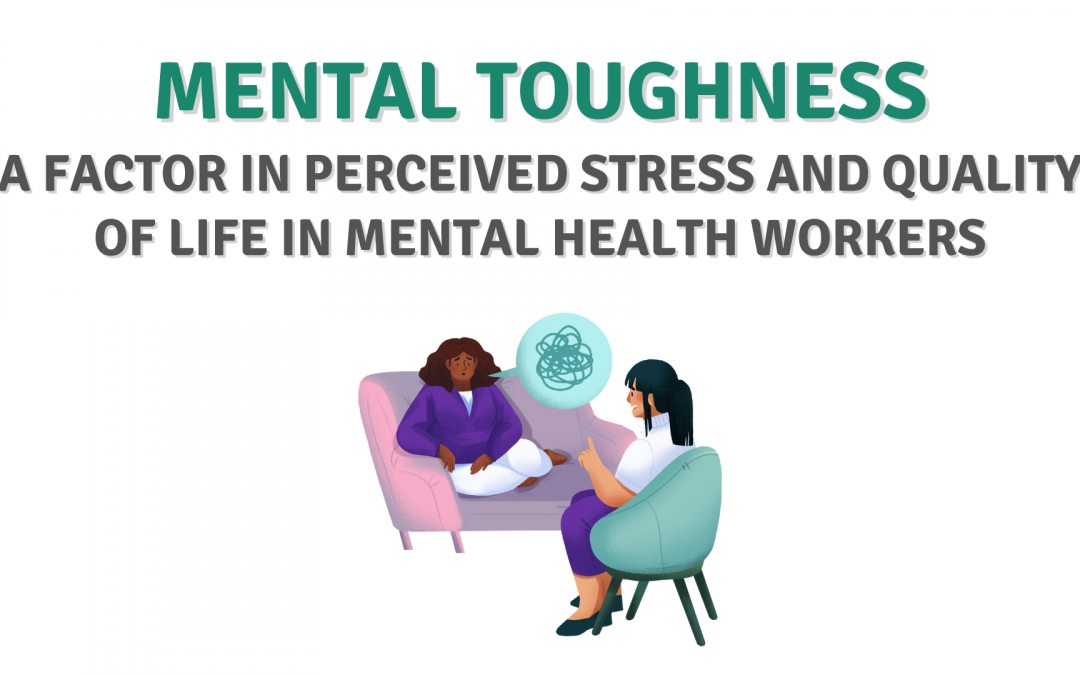An option for developing interventions that protect mental health workers.
A new study (May 2023) carried out by researchers at Newcastle University and Cumbria, Northumberland, Tyne and Wear NHS Foundation Trust has shed light on a major issue for mental health workers*.
It is widely known that the nature of a mental health worker’s role can mean that they run the risk of developing mental health problems. As the study notes:
Continued exposure to the traumatic experiences of others can have emotional and behavioural consequences on the therapist’s health such as sadness, lethargy, anxiety, guilt and shame. This is often referred to as secondary traumatic stress, compassion fatigue or vicarious trauma.
Other stressors exist. Mental health workers can be the subject of verbal and physical abuse.
Studies on other occupations have indicated that mental toughness can be a protective factor against stress.
Using qualitative and quantitative methods, the study used a number of measures including the MTQ48 (the precursor to the MTQPlus) which is derived from the 4Cs mental toughness concept and assesses six factors.
The mental toughness concept is an aspect of our personality which describes how we respond mentally to what happens to us and around us. Invisible, it can be difficult to assess.
The 4 Cs are Control; Commitment; Challenge and Confidence.![]()
Usefully, the study found that:
- The mental health workers with higher levels of mental toughness had lower stress levels and better quality of life.
- In addition, mental health workers with more total years of experience working clinically reported a better quality of life and a higher level of mental toughness.
The first finding is consistent with other research and indeed with the experience of mental toughness practitioners across the globe. It is likely that this will also apply to other occupations that are exposed to high levels of stressors and pressure such as first responder settings, other health service personnel and professionals working in high-performance cultures.
The second finding is equally interesting. It suggests that the more mentally tough might learn to deal with stressors and pressures over time enabling them to deal with these more comfortably. This is consistent with the recent development of the eight-factor version of the 4 Cs concept where we see the Learning Orientation factor emerging as an independent component of the mental toughness concept. These are important findings.
They suggest that assessing mental toughness in individuals would be useful in developing strategies to protect staff in high-stress occupations. This is borne out through the work of practitioners who use the concept and the MTQ measure to s customise development activity for individuals.
There is significant evidence, again from practitioners as well as researchers, that mental toughness development activity could protect those at risk of high-stress levels in other professions. Moreover, apart from the health benefits for the individual, case studies indicate that, where carefully measured, the ROI can be excellent.
Although this too has to be implemented with care. Studies also show that “one size fits all” approaches can be counterproductive. Customisation is important for success which is what the mental toughness concept and measure enables.
For information about becoming a licensed user of the MTQ measures contact: headoffice@aqrinternational.co.uk
The MTQPlus measure is available in fourteen languages.
Completion of the Licensed User Training program is recognised by EMCC and ICF for CPD purposes.
For information about how AQR International can help you or your organisation assess people and offer support (coaching and programmes) go to: headoffice@aqrinternational.co.uk
*Turkington, G. D., Tinlin-Dixon, R., & St Clair-Thompson, H. (2023). A mixed-method exploration of mental toughness, perceived stress and quality of life in mental health workers. Journal of Psychiatric and Mental Health Nursing, 00, 1–18. https://doi.org/10.1111/jpm.12948


